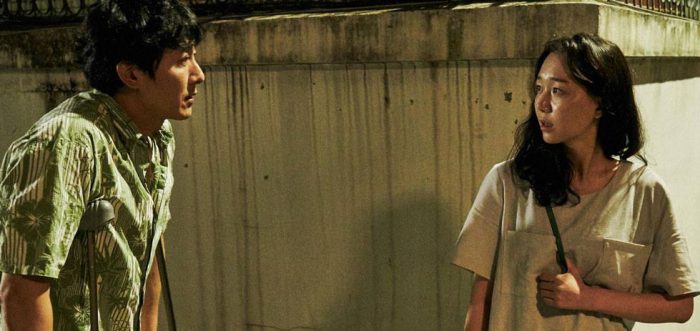
One of director Hong Sang-soo’s favourite cinematic preoccupations is upending conventional notions of temporality, particularly when dealing with romantic narratives. His films repeat, fold in on themselves, and blur time and space without indulging in the light metafiction of American cinematic forebears: Bill Murray knows it’s the same day on repeat; Hong’s protagonists approach their reverted worlds unfazed.
Take his 2015 feature Right Now, Wrong Then. A barrage of A/B testing for a potential romantic fling, the film sees a director (Jung Jae‑young) and an artist (Kim Min-hee) take two passes at happenstantial human connection. It’s perceptive and amusing, yet by virtue of its structural conceit it’s also clinical. Though they feel naturalistic and light, Hong’s best films hum with narrative complexity, revealing themselves on repeat viewings, and under close scrutiny.
This approach makes Yourself and Yours, one of four films he’s released in the last calendar year, so beguiling. It’s a familiar Hong tale — breakups and drunken ramblings set across a handful of specific locations that we return to again and again — but it’s temporally conventional, at least for the viewer. Rather than a time loop imposed upon the characters, Yourself and Yours allows its protagonist to assert a break in linear comprehension — and she drags everyone else along with her.
After a long-term romantic entanglement comes loose, Min-jung (Lee You-young) appears to a series of men infatuated with her as someone else entirely. This involves no physical disguise on her part, but rather a repeated insistence that she is not who they say she is — with the simple act of undercutting their assumed knowledge, she refuses to be complicit in their romantic nostalgia.1 Inevitably, each of the men relents: her paranoid-turned-distraught ex Young-soo (Kim Joo-hyuk), an older friend (Kwon Hae-hyo), and a film director whose eye she caught years earlier (Yoo Jun-sang, reprising his role from Hong’s 2011 mindbender The Day He Arrives). All of the men accept the preposterous in exchange for the potential fulfillment of their romantic fantasies.
In another film, this sequence of events would play out with the audience kept at bay; Hong could have framed Min-jung’s diverging identities as a function of his filmic world, casting her as merely a narrative tool that allows us to better observe the reactions of her male suitors. By re-asserting Min-jung’s agency throughout, Hong toys with those who accuse him of complacency. Here behavioural response and re-evaluation is felt, rather than studied.
Hong’s infamous use of comically jarring zooms reiterates this sense of intimacy. Like much of his recent output, scenes in Yourself and Yours are captured in single long takes; Park Hong-yeol’s static camera reframes, emphasising specific relationships and reactions. This in-frame editing is organic and responsive, heightening the rhythm of dialogue.
The script, free from the burden of self-reflection inherent in his recent collaborations with actress Kim Min-hee, is generic by design. The initial breakup sequence sees Young-soo, panicked about a story he heard of Min-jung’s drinking problem, deliver a twisted variation on the assured defence of her (she couldn’t possibly have been drinking at the bar, at that time) he gave his friend a few hours earlier. Min-jung, too, speaks in rehearsed conversations. She takes each of the men to the same local bar, lightly baiting them with the same taunting lament, that she’s yet to meet “a truly impressive man”. Their awkward responses aren’t rehearsed but they are, naturally, fairly predictable.
The film ends with an inevitable reconciliation between two lost lovers, and the resolution is tinged by this embrace of performance. Young-soo, once concerned primarily with the loss to his reputation — what his friends would think of him if they knew his girlfriend was bar-hopping — is reunited with her only by denying truth. Now Min-jung’s smoke and mirrors act is of no concern to him. He loves her, as he professes many a time, and he needs to be loved (or rather, needs something to break him from a cycle of despair). After sleeping together for the second first-time, they talk about the evening and their sudden strong connection to one another in a manner just as absurd as Young-soo’s earlier daydreams of reconciliation. Here, though, there’s a tenderness that transcends the uncanny plotting.
